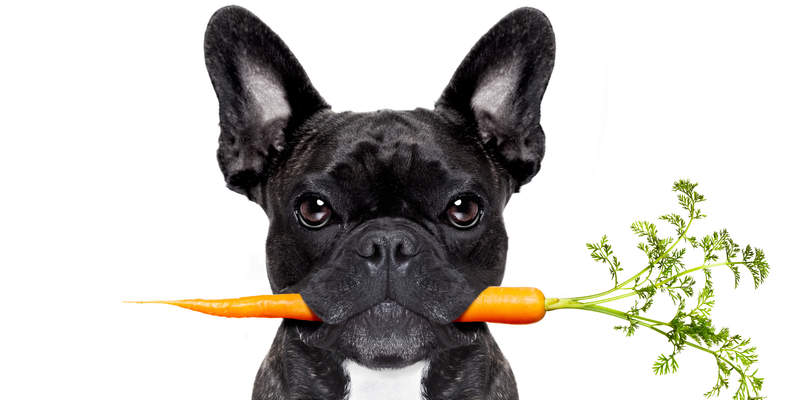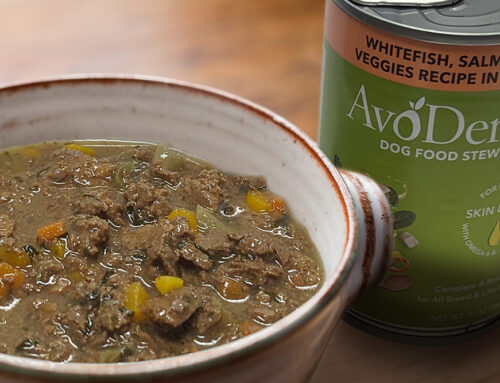AvoDerm Natural® Pet Food products help to keep pets healthy by maintaining the right balance of nutrients in their diet. But it makes sense that responsible pet owners may double as inspired chefs, wanting to share culinary creations with their pet best friends. When prepared in the right manner, the fruits and vegetables featured in this post are safe for dogs and serve beneficial functions in maintaining good health.
What fruits and vegetables can dogs eat?
Fruits and vegetables can be good for dogs by supplementing their regular diet with additional nutrients. An occasional serving of dog-friendly fruits or vegetables with high fiber content can help regulate digestion, prevent constipation, and maintain proper cell and enzyme functioning.
The following vitamins and nutrients are commonly found in fruits and vegetables that are good for dogs and safe to eat:
-
- Magnesium aids in the absorption of other vitamins found in fruits and vegetables and is an important nutrient for dogs. It helps the body produce enough protein and supports healthy bone growth.
- Fruits and vegetables that contain potassium are also good for dogs. Potassium promotes efficient muscle and enzyme function. It also supports the nervous system and helps to maintain a proper fluid balance throughout the body.
- Vitamin K therapy is often used to treat pets for accidental poisoning. Vegetables that contain vitamin K are good for dogs because the vitamin facilitates normal blood clotting, helping the body respond to injuries. It also supports bone health by helping to transport calcium throughout the body.
- Vitamin C is an antioxidant that supports white blood cell function and immune response in both humans and pets.
- Other antioxidants such as vitamins A, E, beta-carotene, and selenium promote healthy skin, eyes, growth, and cellular function in pets. Selenium, found in bananas, spinach, and other fruits and vegetables for dogs, can also help maintain aging skin and hardening tissue.
Dogs can eat the following fruits and vegetables when prepared in a safe manner and receive additional dietary benefits from the nutrients therein. As with any new food or habit, keep an eye on your dog and watch for behavioral changes after introducing fruits and vegetables into their diet.
5 Fruits that are Safe for Dogs:
-
- After the core and the seeds have been removed, apples are safe to share with your pup. This fruit can provide dogs with antioxidants that help to prevent dry, flaky skin.
- Bananas serve as a source of potassium, magnesium, selenium, and vitamins C and B6. They are also high in sugar and carbohydrates, so a suitable portion of fruit for a medium-sized dog is about 1? 2 bananas, served sparingly.
- Sliced cantaloupe is safe to serve to dogs without the skin or seeds. The skin can carry harmful bacteria to your pet, so be sure to dispose of it properly. The fruit itself contains vitamins A, C, beta carotene, dietary fiber, and folic acid.
- Low in carbohydrates and fat, cucumbers are a safe fruit to feed dogs, that are trying to lose weight. Cucumbers provide vitamins C, K, and magnesium, and can be used to freshen dog breath.
- As the name would suggest, watermelon is made of 92% water, making it a great summer snack to keep dogs hydrated. It also contains potassium and vitamins A, B6, and C.
These fruits are safe for dogs to catch a stray bite at potlucks or other functions. However, pet owners should take care to feed dogs safe fruits in a moderate manner. Some fruits have a substantial amount of sugar, which can be toxic for dogs in high amounts.
5 Vegetables that Dogs can Eat
- Brussel sprouts are high in fiber and antioxidants and can be served to dogs if cooked until soft. These dog-friendly vegetables are a good source of vitamins C and K, can help to improve digestive health.
- Frozen carrots are a dog-friendly way of soothing teething pains for young pups. Carrots are a rich source of vitamin A and potassium, and can also be served to dogs after being cooked soft.
- Widely regarded as a superfood, spinach can offer dogs ample amounts of many nutrients, including vitamins A,B, C, K, selenium, and more. However, it is known to cause or accelerate renal issues, so it should be avoided by pets with kidney disease.
- Sweet potatoes are high in fiber content and can help to regulate digestion. They contain many nutrients that support bone and tissue formation and promote metabolism.
- Zucchini is a vegetable that dogs can safely eat shredded on top of their food. Containing vitamin C, magnesium, and potassium, this dog-friendly vegetable can support the immune system and protect against infections.
Dogs should NOT eat vegetables such as onions and garlic, in raw, cooked, or powder form. These vegetables can cause damage to the red blood cells, leading to potentially disastrous complications for your pup. Additionally, corn should not be added to your dog’s diet, as it is a common allergen among pets.
Find more dog-friendly fruits and vegetables:
On an AvoDerm Natural® diet, your dog receives all of the vitamins and nutrients needed to maintain healthy skin and a beautiful coat. Our Revolving Menu® recipes contain delicious recipes made with real vegetables for a fresh and irresistible taste. With an AvoDerm Natural® diet in your dog food bowl, you can savor your own fruit and vegetable creations knowing that your pup is getting the best of the best.





